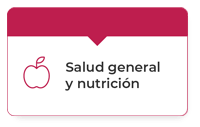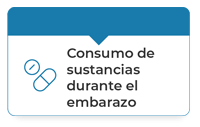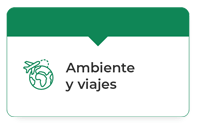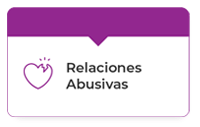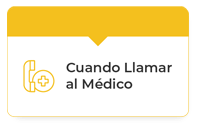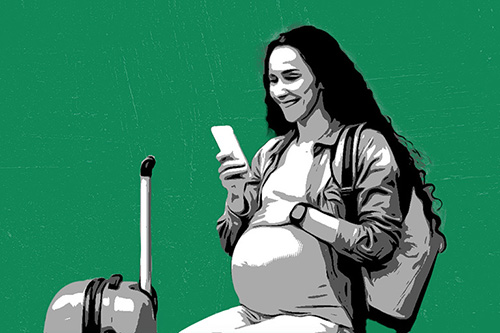
Mantenerse Saludable y Segura
Durante el Embarazo
El estudio HBCD apoya a los participantes durante todo el embarazo, conforme a pautas basadas en la ciencia. Aquí ofrecemos una variedad de información importante acerca del embarazo, incluyendo pautas sobre nutrición y uso de la actividad física, los riesgos del consumo de sustancias, los factores de riesgo ambientales que pueden afectar la salud de las personas embarazadas y más. La información incluida en esta página web proviene de la Oficina para la Salud de la Mujer (Office on Women's Health, OWH) y los recursos vinculados dentro de cada sección. Para conocer las definiciones de los términos utilizados en este recurso, visite: https://espanol.womenshealth.gov/glossary
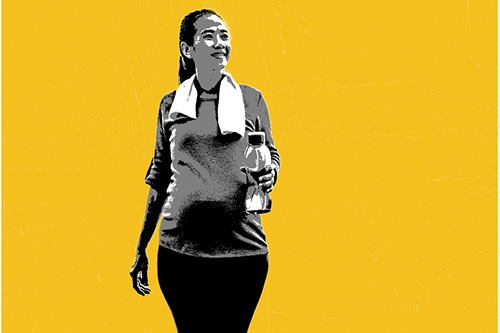 Salud General y Nutrición
Salud General y Nutrición

Los alimentos que ingiere durante el embarazo constituyen la principal fuente de nutrientes para usted y su bebé en desarrollo. Tomar decisiones alimenticias saludables a diario le ayudará a mantenerse saludable y le brindará a su bebé lo que necesita para su desarrollo.
Nutrición y aptitud física
Dependiendo de su estado nutricional previo al embarazo, es posible que necesite aumentar la ingesta de proteínas, hierro, calcio y ácido fólico, así como la cantidad total de calorías. Una alimentación equilibrada combinada con ejercicio físico regular sigue siendo la mejor receta para gozar de un buen estado de salud durante el embarazo. MyPlate.gov puede mostrarle qué alimentos debe consumir y en qué cantidades, distribuidos entre los distintos grupos alimenticios. Consulte a su médico en caso de requerir una dieta especial por algún motivo específico.
La actividad física se complementa con una alimentación adecuada para mantener la salud física y el bienestar durante el embarazo. Ya sea que usted esté embarazada o no, la práctica regular de actividad física contribuye a mantener saludables el corazón, los huesos, y la mente. Las personas que no tienen problemas de salud o seguridad deben realizar al menos 2 horas y 30 minutos de actividad aeróbica de intensidad moderada a la semana. En caso de realizar actividad aeróbica de intensidad vigorosa de manera habitual o de realizar mucha actividad física, podrá mantener su nivel de actividad siempre que no experimente cambios en su estado de salud y que consulte con su médico respecto a su nivel de actividad a lo largo de todo el embarazo.
Para obtener más información, consulte los siguientes recursos:
- Nutrición durante el embarazo (Medlineplus):
https://medlineplus.gov/spanish/pregnancyandnutrition.html - Ejercicios de embarazo:
https://americanpregnancy.org/es/healthy-pregnancy/pregnancy-health-wellness-healthy-pregnancy/pregnancy-workout/ - MyPlate alimentación saludable para mujeres embarazadas o lactantes:
https://www.myplate.gov/es/tip-sheet/alimentacion-saludable-para-mujeres-embarazadas-o-lactantes
Seguridad alimenticia
La mayoría de los alimentos son seguros para usted y su bebé durante el embarazo, pero deberá tener cuidado o evitar consumir ciertos alimentos. Limpie, manipule, cocine, y enfríe los alimentos adecuadamente para prevenir enfermedades transmitidas por los alimentos, como la listeria y la toxoplasmosis:
- Lávese las manos con jabón después de tocar tierra o carne cruda.
- Evite que las carnes, las aves, y los mariscos crudos entren en contacto con otros alimentos o superficies.
- Cocine la carne completamente.
- Lave las frutas y verduras antes de comerlas.
- Lave los utensilios de cocina con agua caliente y jabón.
Para obtener más información, visite:
- Alimentos seguros (Seguridad alimentaria para futuras mamás):
https://www.fda.gov/food/people-risk-foodborne-illness/alimentos-seguros-seguridad-alimentaria-para-futuras-mamas - Opciones de alimentos más seguras para personas embarazadas (CDC):
https://www.cdc.gov/food-safety/foods/pregnant-women.html (en Inglés)
Vitaminas y minerales
Además de tomar decisiones alimenticias saludables, consulte a su médico si debe tomar un suplemento vitamínico y mineral prenatal todos los días para asegurarse de que usted y su bebé reciban los nutrientes suficientes. Durante el embarazo, necesita más ácido fólico, hierro, calcio, vitamina D, vitamina B12 y vitamina A, pero tenga en cuenta que tomar demasiado de un suplemento puede ser perjudicial. Por ejemplo, los niveles muy altos de vitamina A pueden causar defectos de nacimiento, y algunos suplementos contienen mucha más cantidad de esta vitamina de lo que es necesario. Solo tome suplementos vitamínicos y minerales que su médico recomiende. También puede consultar la etiqueta de los alimentos que compra para ver las cantidades de ciertos nutrientes que contiene el producto.
Para obtener más información, visite:
- Nutrientes y vitaminas para el embarazo:
https://americanpregnancy.org/es/healthy-pregnancy/pregnancy-health-wellness-healthy-pregnancy/pregnancy-vitamins-nutrients/
Líquidos
El agua es importante para el cuerpo. Durante el embarazo, el cuerpo necesita aún más agua para mantenerse hidratado y ayudar al crecimiento del bebé.
Cuánta agua deben beber las personas embarazadas
El Colegio Americano de Obstetras y Ginecólogos (American College of Obstetricians and Gynecologists, ACOG) recomienda beber de 8 a 12 tazas (cada taza es de 8 onzas; en total, entre 64 y 96 onzas) de agua todos los días durante el embarazo. El agua también ayuda a prevenir el estreñimiento, las hemorroides, la hinchazón excesiva y las infecciones del tracto urinario o de la vejiga.
Riesgos de no beber suficiente agua
No beber suficiente agua puede provocar contracciones prematuras o precoces. Una buena manera de saber si su consumo de líquidos está bien es si su orina es de color amarillo claro o incolora y si rara vez siente sed. La sed es una señal de que su cuerpo se está deshidratando. No espere a sentir sed para beber.
Para obtener más información, visite:
- ¿Cuánta agua beber en el embarazo?
https://www.reproduccionasistida.org/faqs/cuanta-agua-beber-en-el-embarazo/
Cafeína
La cafeína en cantidades moderadas parece ser segura durante el embarazo. Cantidades moderadas significa menos de 200 mg de cafeína por día, lo cual equivale aproximadamente a 12 onzas de café. La mayoría de los tés y refrescos con cafeína contienen mucha menos cafeína. Algunos estudios han demostrado que existe una relación entre cantidades elevadas de cafeína y el aborto espontáneo y el parto prematuro. Sin embargo, no hay pruebas sólidas de que la cafeína cause estos problemas. Los efectos de un exceso de cafeína no están claros. Pregunte a su médico si tomar una cantidad limitada de cafeína es adecuado para usted.
Para obtener más información, visite:
- El consumo de cafeina durante el embarazo (americanpregnancy.org):
https://americanpregnancy.org/es/healthy-pregnancy/pregnancy-health-wellness-healthy-pregnancy/caffeine-intake-during-pregnancy/
Uso de medicamentos y hierbas
Usted y su bebé están conectados. Los medicamentos que usted ingiera (incluidos los medicamentos o suplementos de venta libre, a base de hierbas y recetados) podrían llegar al cuerpo de su bebé también.
Muchos Medicamentos y Hierbas No Han Sido Probados
Se sabe que muchos medicamentos y hierbas que se usan de manera segura fuera del embarazo causan problemas durante el embarazo, incluso defectos congénitos. En el caso de algunos medicamentos, no se sabe mucho sobre cómo podrían afectar al embarazo o al feto en desarrollo. Esto se debe a que los medicamentos rara vez se prueban durante el embarazo por temor a dañar al bebé.
Consulte a Su Médico Sobre los Riesgos
Es posible que se pregunte si es seguro usar medicamentos durante el embarazo. Aún no hay una respuesta clara a esta pregunta. Su médico puede ayudarla a decidir si usar o no un medicamento. Las etiquetas de los medicamentos recetados y de venta libre tienen más información para ayudarles a usted y a su médico a tomar una decisión. Consulte siempre con su médico antes de comenzar o suspender cualquier medicamento. No ingerir el medicamento que necesita podría ser más perjudicial para usted y su bebé que ingerirlo.
Comparar los beneficios y riesgos
A la hora de decidir si debe usar un medicamento durante el embarazo, usted y su médico deben hablar sobre los beneficios y los riesgos. Beneficios -¿en qué me puede beneficiar el medicamento a mí o a mi bebé en desarrollo? Riesgos -¿qué puede ocurrirme a mí o a mi bebé si uso este medicamento?
Uso de suplementos dietéticos o a base de hierbas y otros productos naturales
Es posible que piense que las hierbas son seguras porque son naturales. Sin embargo, a excepción de algunas vitaminas, se sabe poco sobre el uso de suplementos dietéticos o a base de hierbas durante el embarazo. Algunas etiquetas de remedios a base de hierbas afirman que ayudan durante el embarazo. No obstante, en la mayoría de los casos, no hay estudios confiables que demuestren si estas afirmaciones son ciertas o si las hierbas pueden causarle daño a usted o a su bebé. Además, algunas hierbas que son seguras cuando se usan en pequeñas cantidades como parte de la alimentación podrían ser perjudiciales cuando se usan en grandes cantidades como medicamentos. Por lo tanto, hable con su médico antes de usar cualquier tipo de suplemento dietético o a base de hierbas, o producto natural.
Para obtener más información, consulte los recursos incluidos en esta página:
- Embarazo y medicamentos:
https://espanol.womenshealth.gov/a-z-topics/pregnancy-and-medicines
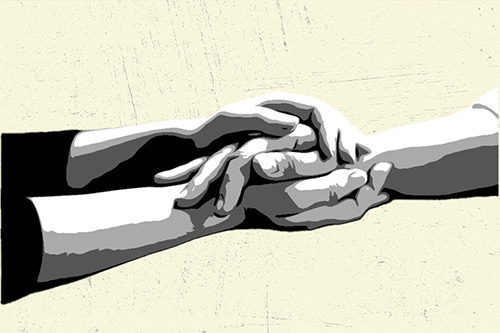 Consumo de Sustancias Durante el Embarazo
Consumo de Sustancias Durante el Embarazo
El consumo de sustancias como la nicotina, el alcohol, el cannabis y otras drogas ilícitas o ilegales durante el embarazo puede dañar su salud y la de su bebé. Lo mismo ocurre con el uso de medicamentos recetados de manera diferente a la prescrita. Estas sustancias atraviesan la placenta y llegan a su bebé, lo que puede ponerlo/a en riesgo de sufrir problemas, tales como: muerte fetal, bajo peso al nacer, defectos congénitos, problemas de conducta y retrasos en el desarrollo. Nunca es demasiado tarde para dejar de consumir alcohol o drogas; dejar de hacerlo no solo mejorará su salud, sino que también mejorará la salud y el bienestar de su bebé.
Consumo de nicotina
Fumar cigarrillos, vapear (en inglés) o usar productos con nicotina (como tabaco de mascar o bolsas de nicotina) perjudica su salud y también podría afectar la salud de su bebé. Fumar puede provocar cáncer y enfermedades cardiacas en las personas fumadoras, y, durante el embarazo, aumentar el riesgo de bajo peso al nacer.
Riesgos del consumo de tabaco
Los bebés con bajo peso al nacer corren un mayor riesgo de sufrir problemas de salud poco después de nacer. Además, en algunos estudios se ha relacionado el bajo peso al nacer con un mayor riesgo de desarrollar problemas de salud más adelante en la vida, como hipertensión y diabetes. Las personas que fuman durante el embarazo tienen más probabilidades de sufrir un aborto espontáneo y de que su bebé nazca con labio leporino o paladar hendido, dos tipos de defectos congénitos. Además, el consumo de tabaco durante o después del embarazo, y/o la exposición al tabaquismo pasivo (en inglés) puede aumentar el riesgo de síndrome de muerte súbita del lactante (SIDS) en su bebé.
Obtenga ayuda para dejar de fumar
Los padres que fuman tienen muchas razones para dejar de fumar. Cuide su salud y la de su bebé: consulte a su médico sobre formas de ayudarla a dejar de fumar durante el embarazo. Se ha demostrado que el asesoramiento intensivo aumenta las probabilidades de dejar de fumar con éxito. Dejar de fumar es difícil, pero puede hacerlo con ayuda.
Para obtener más información, visite:
- Tabaquismo, embarazo y bebés:
https://www.cdc.gov/tobacco/campaign/tips/spanish/enfermedades/tabaquismo-embarazo.html- Los cigarrillos electronicos y el embarazo:
https://americanpregnancy.org/es/healthy-pregnancy/is-it-safe/are-e-cigarettes-safe-during-pregnancy/- Deje de fumar por dos:
https://espanol.smokefree.gov/deje-de-fumar/deje-de-fumar-por-dos
Consumo de alcohol
No se conoce una cantidad segura de alcohol que se pueda consumir durante el embarazo. El consumo de alcohol durante el embarazo puede provocar abortos espontáneos, muertes fetales, y una variedad de discapacidades de por vida conocidas como trastornos del espectro alcohólico fetal (FASD), que pueden provocar numerosas discapacidades físicas, conductuales e intelectuales.
Cannabis (“marihuana”) o productos cannabinoides
La exposición al delta-9-THC, la sustancia química psicoactiva del cannabis, durante el embarazo está asociada a riesgos para la salud del recién nacido, tales como el parto prematuro y bajo peso al nacer; en algunos estudios se relaciona dicha exposición con cambios en el desarrollo cerebral.
Delta-8 y CBD
Todavía no se han estudiado los efectos durante el embarazo de productos más nuevos como el delta-8-THC, pero estos cannabinoides son químicamente similares al delta-9-THC y producen efectos biológicos parecidos. Aunque se necesita más investigación para comprender mejor cómo el CBD puede afectarla a usted y a su bebé durante el embarazo, los estudios en animales muestran que las dosis altas tienen efectos negativos en los fetos en desarrollo. Se recomienda que las personas embarazadas no usen cannabis ni productos cannabinoides de ningún tipo (como fumar, vapear o comestibles).
Para obtener más información, consulte estos recursos:
- Marihuana y embarazo:
https://www.cdph.ca.gov/Programs/CFH/DWICSN/CDPH%20Document%20Library/Families/FeedingMyself/Marijuana_and_Pregnancy-Sp.pdf- Lo que debe saber acerca del uso de cannabis, incluyendo CBD, mientras está embarazada o amamantando a su bebé:
https://www.fda.gov/consumers/articulos-para-el-consumidor-en-espanol/lo-que-debe-saber-acerca-del-uso-de-cannabis-incluyendo-cbd-mientras-esta-embarazada-o-amamantando
Consumo de fentanilo
¿Qué es el Fentanilo?
El fentanilo es un opioide sintético que a veces se utiliza durante intervenciones quirúrgicas o para tratar dolores intensos. El fentanilo (o drogas similares) también puede fabricarse y venderse ilegalmente o utilizarse para potenciar otras drogas ilegales.
Riesgos del Consumo de Fentanilo
En los últimos años, las sobredosis relacionadas con drogas han aumentado y cada año mueren más de 100,000 personas. La mayoría de ellas se deben al fentanilo vendido ilegalmente, solo o en combinación con otras sustancias, especialmente cocaína, metanfetamina y píldoras falsas que se asemejan a medicamentos recetados. El fentanilo es muy potente e incluso pequeñas cantidades pueden provocar una sobredosis mortal. La naloxona puede revertir las sobredosis de fentanilo si se administra rápidamente y en una dosis suficientemente alta.
Fentanilo y Embarazo
El uso de fentanilo durante el embarazo puede aumentar el riesgo de sufrir problemas relacionados con el embarazo y puede aumentar los síntomas neonatales de abstinencia de opioides (NOWS) en los bebés. Para obtener más información sobre cómo reducir el riesgo de exposición accidental al fentanilo y la sobredosis de fentanilo, visite harmreduction.org (en inglés). Para traducir una página web de inglés a español, primero copie el siguiente enlace en su navegador: https://translate.google.com/?sl=auto&tl=es&text=harmreduction.org&op=translate. En la ventana izquierda, asegúrese de seleccionar Inglés (si no aparece automáticamente) y copie y pegue el link de la página que desea traducir; y en la ventana derecha, seleccione Español. Luego, haga clic en el enlace (link de la página web) que aparece en la ventana derecha para acceder a la versión traducida en español. La página se abrirá automáticamente en español, permitiéndole leer la información en su idioma. En caso de que la página se abra en inglés, aparecerá una pequeña ventana en la parte inferior derecho de la página web. Haga clic en "Accept all" para aceptar las cookies y luego en "Got it" para confirmar. Después de unos segundos, la página se traducirá automáticamente al español.
Para obtener más información, visite:
- El Fentanilo (NIDA):
https://nida.nih.gov/es/areas-de-investigacion/el-fentanilo- Recursos Sobre el Fentanilo:
https://hbcdstudy.org/families/resources/fentanylresources/ (en inglés)
Otras drogas
Muchas personas que consumen drogas ilegales o que no les han sido recetadas, también consumen tabaco y alcohol. Por eso, no siempre es fácil distinguir los efectos de una droga de los del alcohol, el tabaco, u otras drogas. Se sabe que el uso de drogas ilegales durante el embarazo es peligroso. Los bebés nacidos de consumidores habituales de drogas, como la cocaína, heroína y metanfetamina, a menudo sufren abstinencia. Las personas que se inyectan drogas tienen un mayor riesgo de contraer VIH, que puede transmitirse al bebé. Algunos estudios sugieren que los efectos del consumo de drogas durante el embarazo podrían no ser evidentes hasta más adelante en la infancia.
Obtener ayuda para el consumo de alcohol o drogas
Si bebe alcohol o consume drogas y no puede dejar de hacerlo, hable de inmediato con su médico. Los programas de tratamiento pueden ayudarla con los trastornos por consumo de sustancias. Para encontrar ayuda cercana, use el localizador de instalaciones para tratamientos de consumo de sustancias en FindTreatment.gov/es o llame a la Línea de Ayuda Nacional de SAMHSA al 1-800-662-HELP (4357). La línea de ayuda es un servicio de información y derivación a tratamientos (en inglés y español) gratuito, confidencial, disponible las 24 horas del día, los 7 días de la semana, los 365 días del año, para personas y familias que padecen trastornos mentales o por consumo de sustancias.
Para obtener más información, consulte los recursos incluidos en estas páginas: Línea de Ayuda Nacional de SAMHSA y FindTreatment.gov/es.
Viajes
![]()
La vida cotidiana continúa durante el embarazo. La mayoría de las veces puede seguir con su rutina y nivel de actividad habituales. Eso significa ir a trabajar, hacer recados y, para algunas, viajar fuera de casa.
Elija destinos seguros
Hable con su médico antes de tomar cualquier decisión que la aleje de casa. Pregunte si alguna afección de salud podría hacer que viajar durante el embarazo no sea seguro para usted. También considere el destino. ¿La comida y el agua serán seguros? ¿Existe riesgo de infecciones transmitidas por mosquitos, como el Zika o la malaria? ¿Necesitará vacunarse antes de viajar? ¿Hay buena atención médica disponible en caso de emergencia? ¿Su seguro médico cubrirá la atención médica en su destino?
Evite estar sentada demasiado tiempo
Evite permanecer sentada mucho tiempo durante el viaje, ya que esto puede afectar al flujo sanguíneo de las piernas. Los viajes ocasionales en avión son seguros para la mayoría de las mujeres durante el embarazo, y la mayoría de las compañías aéreas le permitirán viajar hasta las 36 semanas de embarazo. Lleve una copia de su expediente médico e infórmese sobre la atención médica en el lugar de destino para estar preparada en caso de emergencia.
Abróchese el cinturón de seguridad
Abróchese el cinturón de seguridad. Usar el cinturón de seguridad durante los viajes en automóvil y avión es seguro durante el embarazo. La correa de la cintura debe pasar por debajo del vientre y por encima de las caderas. La correa del hombro debe ir entre los pechos o en el centro del pecho y a un lado del vientre. Asegúrese de que quede ajustada. Si sospecha que hay algún problema con su embarazo durante el viaje, no espere hasta regresar a casa para ver a su médico. Busque atención médica de inmediato.
Para obtener más información, consulte los recursos incluidos en esta página:
- ¿Es seguro viajar estando embarazada?
https://www.reproduccionasistida.org/viajar-embarazada/
Riesgos ambientales
El entorno es todo lo que nos rodea dondequiera que estemos: en casa, en el trabajo o al aire libre. Aunque no es necesario preocuparse por cada pequeña cosa que inhale o ingiera, es prudente evitar la exposición a sustancias que podrían poner en riesgo su embarazo o la salud de su bebé. Durante el embarazo, haga lo posible para evitar la exposición a lo siguiente:
- Plomo: se encuentra en algunos tipos de agua y pinturas, principalmente en casas construidas antes de 1978.
- Mercurio: su forma dañina se encuentra principalmente en peces depredadores de gran tamaño (por ejemplo, tiburones y peces espada).
- Arsénico: en el agua de algunos pozos pueden encontrarse niveles elevados.
- Pesticidas: en productos domésticos y pesticidas agrícolas.
- Solventes: desengrasantes, removedores, y diluyentes de pintura.
- Humo de cigarrillo.
Tenga en cuenta que: No se sabe cuánta exposición puede provocar problemas, como abortos espontáneos o defectos congénitos. Por eso, es mejor evitar o limitar la exposición tanto como sea posible.
Riesgos ambientales en el lugar de trabajo
Además, podría haber otros riesgos ambientales que no figuran en la lista anterior. Si está expuesta a sustancias químicas en el lugar de trabajo, hable con su médico y su empleador sobre lo que puede hacer para reducir la exposición. Ciertas industrias, como la tintorería, la fábrica, la imprenta y la agricultura, involucran el uso de toxinas que podrían ser perjudiciales.
¿Le preocupa la calidad del agua?
Si le preocupa la seguridad del agua que bebe, llame al departamento de salud o al proveedor de agua para preguntar por la calidad del agua del grifo o cómo analizarla. O bien, llame a la Línea directa de agua potable segura de la Agencia de Protección Ambiental (Environmental Protection Agency, EPA) al (800) 426-4791.
Para obtener más información, consulte los recursos incluidos en esta página:
- Riesgos ambientales y el embarazo:
https://nacersano.marchofdimes.org/embarazo/riesgos-ambientales-y-el-embarazo.aspx
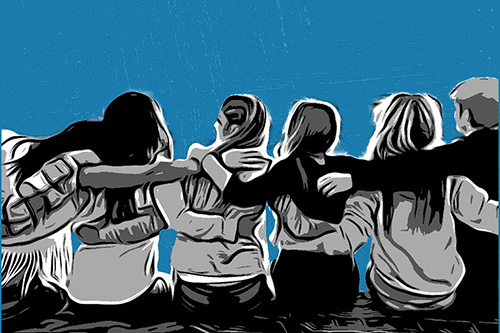 Relaciones Abusivas
Relaciones Abusivas

Las relaciones abusivas pueden comenzar o aumentar durante el embarazo y pueden dañarla a usted y a su bebé. Aquellas personas que sufren abusos a menudo no reciben la atención prenatal que ellas y sus bebés necesitan. Esto puede provocar trastornos físicos y mentales antes y después del embarazo, así como partos prematuros, bajo peso al nacer, muerte fetal, y otros problemas para los bebés. Ahora es un buen momento para pensar en la seguridad y el bienestar suyo y de su bebé.
Otenga ayuda para salir de una relación abusiva
Es posible salir de una relación abusiva, y los exámenes prenatales ofrecen una buena oportunidad para buscar ayuda. Si se encuentra en una relación abusiva, permita que el embarazo y la seguridad de su bebé la motiven a actuar ahora. Si es víctima de abuso o violencia a manos de alguien que conoce o ama, o está recuperándose de una agresión por parte de un desconocido, usted y su bebé pueden obtener ayuda y apoyo de inmediato.
- La Línea Directa Nacional contra la Violencia Doméstica está disponible las 24 horas del día, los 7 días de la semana, en el 800-799-SAFE (7233) y el 800-787-3224 (TTY). Hay servicio de atención en español. Cuando llame, escuchará primero una grabación y es posible que tenga que esperar. El personal de la línea directa ofrece intervención en crisis y derivaciones. Si lo solicita, pueden conectarla con refugios y enviarle información por escrito.
- La Línea Directa Nacional contra el Abuso Sexual está disponible las 24 horas del día, los 7 días de la semana, en el 800-656-4673. Cuando llame, escuchará un menú y podrá elegir el número 1 para hablar con un consejero. Luego, la contactarán con un consejero en su área que pueda ayudarla. También puede consultar en la Línea Directa Nacional de Ayuda en Línea contra el Abuso Sexual (en Inglés)
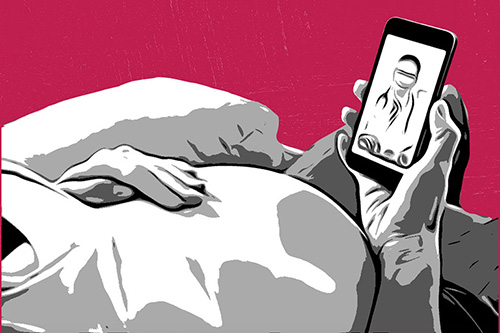 Cuando Llamar al Médico
Cuando Llamar al Médico

Durante el embarazo, no dude en llamar a su médico o proveedor de atención prenatal (como una partera o doula) si algo le molesta o preocupa. A veces, los cambios físicos pueden ser señales de un problema. Las razones enumeradas a continuación podrían no ser las únicas razones para llamar a su médico. Llame a su médico o proveedor de atención prenatal tan pronto como pueda en los siguientes casos:
- Está sangrando o goteando líquido de la vagina
- Tiene hinchazón repentina o grave en el rostro, las manos o los dedos
- Tiene dolores de cabeza severos o persistentes
- Presenta molestias, dolor, o calambres en el bajo vientre
- Tiene fiebre o escalofríos
- Está vomitando o tiene náuseas persistentes
- Siente molestias, dolor, o ardor al orinar
- Tiene problemas para ver o visión borrosa
- Se siente mareada
- Sospecha que su bebé se está moviendo menos de lo normal después de las 28 semanas de embarazo (si cuenta menos de 10 movimientos en 2 horas)
- Piensa en hacerse daño a sí misma o a su bebé
